THE HOUSE OF LOVE AND MUSIC
Many artists, being generally unsuited for life in normal society, have often dreamed of a place where they could be with others of their ilk. Where they would be free to live and create without the sinewy hand of mediocrity shackling them with public morals and conventions. A place where they could collaborate with their fellow artists, as well as partake of mind-altering substances, have lots of sex, and generally enjoy themselves without having to hide or make excuses. Enclaves that fit this basic description have existed throughout history, at least in theory, but usually not for very long. One such hermitage was known as “February House,†dubbed so by Anaïs Nin (or so the story goes) because so many of its inhabitants had birthdays in February. The place was a dilapidated brownstone at 7 Middagh Street, in Brooklyn Heights, and in the period between roughly 1940 and 1941 it served as home to a number of noteworthy writers, poets and musicians.
The wonderful new musical February House, currently playing at The Public Theater, with a top notch book by Seth Bockley, inspired music and lyrics by Gabriel Kahane (which include excerpts from the poems of W. H. Auden), and brilliant performances by the entire case, draws on the events at this historic house, imagining what life at the old brownstone was like.
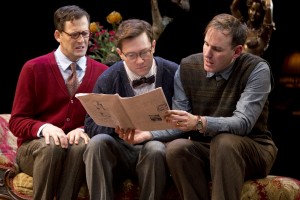 The residents/characters are: The writer, Carson McCullers (Kristen Sieh); the poet W. H. Auden (played with tragic sensitivity by Erik Lochtefeld); Auden’s nineteen-year-old lover, the poet Chester Kallman (A. J. Shively); the composer Benjamin Britten (Stanley Bahorek); Britten’s partner and collaborator, the tenor Peter Pears (Ken Barnett); Gypsy Rose Lee (Kacie Sheik); and the writer, actress and eldest daughter of Thomas, Erika Mann (the striking Stephanie Hayes). Their benefactor is the notable editor, novelist and epicurean George Davis (the delightful Julien Fleisher), who’s rented the boarding house and turned it into the bohemian commune for displaced artists that it is. Ken Clark rounds out the cast as Reeves McCullers, Carson’s estranged and abusive husband, a man’s man, who is the only one expressly not invited into the fold.
The residents/characters are: The writer, Carson McCullers (Kristen Sieh); the poet W. H. Auden (played with tragic sensitivity by Erik Lochtefeld); Auden’s nineteen-year-old lover, the poet Chester Kallman (A. J. Shively); the composer Benjamin Britten (Stanley Bahorek); Britten’s partner and collaborator, the tenor Peter Pears (Ken Barnett); Gypsy Rose Lee (Kacie Sheik); and the writer, actress and eldest daughter of Thomas, Erika Mann (the striking Stephanie Hayes). Their benefactor is the notable editor, novelist and epicurean George Davis (the delightful Julien Fleisher), who’s rented the boarding house and turned it into the bohemian commune for displaced artists that it is. Ken Clark rounds out the cast as Reeves McCullers, Carson’s estranged and abusive husband, a man’s man, who is the only one expressly not invited into the fold.
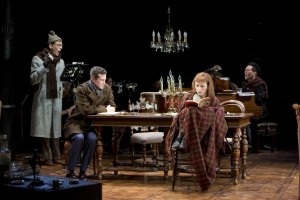 With war underway in distant Europe and America in a state of indecision, the housemates at 7 Middagh Street occupy themselves with civilian pursuits and tribulations. Carson struggles with her second novel, anxious about having left her husband and the South. W. H Auden agonizes over his stance to not speaking out in support of fighting the Germans, over his libretto to “Paul Bunyan,†and over his passionate love for young Chester, which he fears may not be reciprocal. Benjamin and Peter, set upon by ravenous bedbugs, bitter cold and the incessant noise of their comrades, are no longer sure that leaving the middle-class comforts and constraints of Long Island for the freedom and poverty at their current residence was such a good idea. Erika makes subtle overtures to Carson while fighting to get the American public, as well as her pacifist neighbors, to see the necessity of going to war. George looks after his guests like a mother hen, as he desperately tries to keep his adopted family together despite the indigent conditions. And Gypsy Rose, the only one in the group with money and a light heart, has decided to give up her vaudeville life and write a novel titled “The G-String Murders.â€
With war underway in distant Europe and America in a state of indecision, the housemates at 7 Middagh Street occupy themselves with civilian pursuits and tribulations. Carson struggles with her second novel, anxious about having left her husband and the South. W. H Auden agonizes over his stance to not speaking out in support of fighting the Germans, over his libretto to “Paul Bunyan,†and over his passionate love for young Chester, which he fears may not be reciprocal. Benjamin and Peter, set upon by ravenous bedbugs, bitter cold and the incessant noise of their comrades, are no longer sure that leaving the middle-class comforts and constraints of Long Island for the freedom and poverty at their current residence was such a good idea. Erika makes subtle overtures to Carson while fighting to get the American public, as well as her pacifist neighbors, to see the necessity of going to war. George looks after his guests like a mother hen, as he desperately tries to keep his adopted family together despite the indigent conditions. And Gypsy Rose, the only one in the group with money and a light heart, has decided to give up her vaudeville life and write a novel titled “The G-String Murders.â€
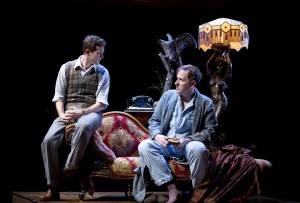 February House, directed with precision and inventiveness by Davis McCallum, achieves a fine balance, exploring its themes without being overburdened by them. The show is entertaining without being trivial, poignant but not heavy; for one thing, it admirably avoids the trap of having characters speak in abstractions, a tempting sin considering the literary figures involved. The elements of this show, from the book to the performances, to the expressive costumes (Jess Goldstein), work in harmony to evoke that fleeting instant when chance brought these artists together and created a tiny, enchanted world in a vermin-infested dump.
February House, directed with precision and inventiveness by Davis McCallum, achieves a fine balance, exploring its themes without being overburdened by them. The show is entertaining without being trivial, poignant but not heavy; for one thing, it admirably avoids the trap of having characters speak in abstractions, a tempting sin considering the literary figures involved. The elements of this show, from the book to the performances, to the expressive costumes (Jess Goldstein), work in harmony to evoke that fleeting instant when chance brought these artists together and created a tiny, enchanted world in a vermin-infested dump.
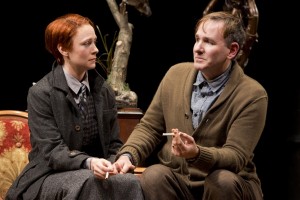 It is into this world that the creators of February House want to take us. They are like excited children bringing us to their secret fort, a fort where the odd (artists, foreigners, homosexuals) need not fear persecution or judgment, where they are accepted, free to be who they are, to create, and to love whom they please. I suspect also that what makes this sanctuary all the more cozy for the show’s creators is a particular kind of nostalgia, not for gay persecution exactly, but for a time when being gay in America was special, dangerous, illicit. When it was like being in a society of subversives, which made safe places and sympathetic individuals that much more precious.
It is into this world that the creators of February House want to take us. They are like excited children bringing us to their secret fort, a fort where the odd (artists, foreigners, homosexuals) need not fear persecution or judgment, where they are accepted, free to be who they are, to create, and to love whom they please. I suspect also that what makes this sanctuary all the more cozy for the show’s creators is a particular kind of nostalgia, not for gay persecution exactly, but for a time when being gay in America was special, dangerous, illicit. When it was like being in a society of subversives, which made safe places and sympathetic individuals that much more precious.
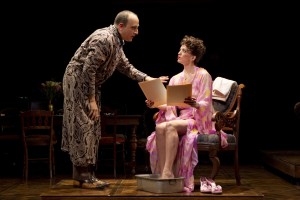 The simple set – there are no walls or doors (set design: Riccardo Hernandez) – is convincingly transformed into different areas of the house through ingenious lighting and sound design (Mark Barton and Leon Rothenberg, respectively), as well as by the performers, whose characters change in relation to the space they are in. An exemplary scene comes to mind. It begins with all the characters gathered in the “main room.†Then the stage darkens. The lights of the Brooklyn Bridge begin to glow on the rear wall. Street noise fades up. And suddenly we are on the roof of the house, celebrating New Year’s Eve with the gang. Many such transformations occur throughout the show, often in exciting, rapid succession. But so exact is their orchestration that we are never confused, never lost.
The simple set – there are no walls or doors (set design: Riccardo Hernandez) – is convincingly transformed into different areas of the house through ingenious lighting and sound design (Mark Barton and Leon Rothenberg, respectively), as well as by the performers, whose characters change in relation to the space they are in. An exemplary scene comes to mind. It begins with all the characters gathered in the “main room.†Then the stage darkens. The lights of the Brooklyn Bridge begin to glow on the rear wall. Street noise fades up. And suddenly we are on the roof of the house, celebrating New Year’s Eve with the gang. Many such transformations occur throughout the show, often in exciting, rapid succession. But so exact is their orchestration that we are never confused, never lost.
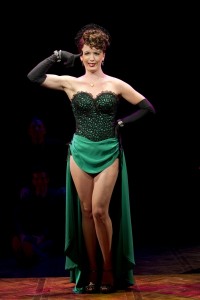 A similar back and forth happens in a few of the musical numbers, with many characters singing their own inner monologues in counterpoint. Here the music, supplied by an onstage orchestra, does tend to swell a little too much. But the voice orchestration is perfect. Particularly lovely is the intimacy with which many of the songs are performed (some of them nearly whispered). It’s as if they have a certain unpolished quality about them, which serves to make our connection to these characters and to the world on the stage all the more personal.
A similar back and forth happens in a few of the musical numbers, with many characters singing their own inner monologues in counterpoint. Here the music, supplied by an onstage orchestra, does tend to swell a little too much. But the voice orchestration is perfect. Particularly lovely is the intimacy with which many of the songs are performed (some of them nearly whispered). It’s as if they have a certain unpolished quality about them, which serves to make our connection to these characters and to the world on the stage all the more personal.
“I would like to join your February House,†says Erika Mann near the beginning of the show. And thanks to all the skilled and talented individuals responsible for this excellent production, I know how she feels.
photos by enter Joan Marcus
February House
The Public Theater in New York City (New York Theater)
scheduled to end on June 17, 2012
for tickets, visit http://www.publictheater.org
